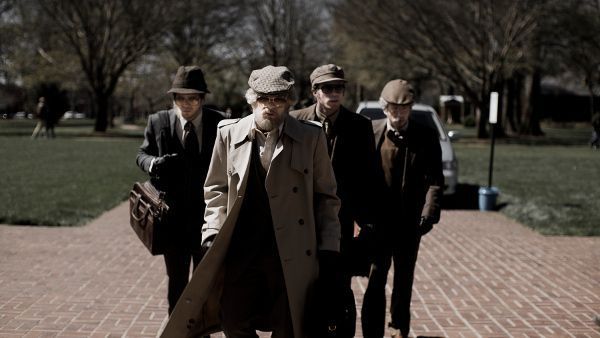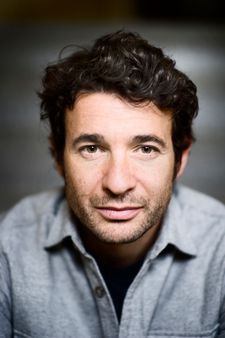I caught up with Bart Layton and the cast at Sundance after the world premiere, and Layton explained how the writing process worked - and was reworked - after speaking to Lipka, Allen, Reinhard and Borsuk.
"I had to throw away what I had in the screenplay and start the interviews from the beginning and just go for the most honest responses that I could get. Then I ended up rewriting the screenplay around those.
"There was no road map in terms of the template and that was the thing with the producers and the financers, it was a totally unconventional process."
The process was fairly unconventional for the actors as well. They did meet the person they were going to play on one occasion but given that the re-enactments are as much fuelled by fantasy as reality the script was also key.
Peters said: "I think Bart gave us the freedom to do that because it was a fantasy in a weird way. There was the reality which was played by all the real guys as a juxtaposition to us in this sort of weird movie version of it. I think because we did have footage of the real guys and we did know there was going to be that real element, there was sort of this feeling that we wanted to honour that and to keep it as real as possible without destroying that going from the page.
"Making it your own and sort of doing it as if you were 20 and in that position and sort of connecting with why they did as opposed to re-enacting who they were."
"The fact that it's a true story just made it all the more important to get in dirty with these guys and tap back to how impulsive I was as a young man," added Jenner "You're kind of thinking a mile a minute - so once you're in the thick of a situation like this, all the emotions are flying. So it meant a lot to me to have a sort of truth."
Despite the name of the film, Canadian Abrahamson and rising Irish star Keoghan aren't American animals at all - did that make a difference?
Keoghan laughs when I ask, "I always thought of myself as an Irish animal, like a sheep or something," he said, before talking about the work he put in to perfect the US accent, which he kept up throughout the shoot.
"I never broke it for eight or nine weeks," he said.
"Even on the weekend, we could have a beer and he's still continue in that voice," added Abrahamson. "I respected it, all the work he's put in."
"It was tough because you have 52 mouth muscles and they stay that way," Barry added, "I put a lot of work into that. But if it looked easy, I've done my job well."
He was so convincing that even members of the film crew didn't realise he was Irish. Layton said: "One of the crew from North Carolina heard him speaking after the rap in broad Irish and was like, 'Is he not American?'."
When it comes to the structure of the film itself, Layton, plays around with the reliability of memory and the willingness to create false narratives, something that was also key to his first film The Imposter.
"When you have the true story thing, there's always that thing of whose version are you recreating or fictionalising?" He says. "With this, because they're different versions of the same events, you're either choosing between or make a virtue of the fact that memory is unreliable and plant a seed with the audience that not everything is quite as it seems and is there something else going on?
"Is the fantasy a fabricated construct that Warren has created, for example, to allow them to all live in the fantasy world. So there are things that he may or may not have invented - like his trip to see the counterfeiter to get the details for the fence. Did any of these people actually exist or did he create that? One of the questions you're invited to ask is, what is it they were after? Is it inhabiting the fantasy or was it actually the books? Were the books just a macguffin? Were they ever thinking to actually do it or was it just the adventure that was really the thing they were all interested in?"
The fantasy comes crashing into reality as the film progresses, with Layton wrong-footing audience expectations by emphasising what happened to the human victim of the crime, librarian Betty Jean Gooch.
"They sort of get seduced by a fantasy and they get a bit lost in it to the point where, in their minds, it'll all be fine," said Layton "They lose sight of the fact that the major obstacle is that there's an actual person, and how is that going to be dealt with? So, in our minds, we all came to the conclusion that the real crime is nothing to do with the theft, it's to do with the physical encounter and violence towards the victim, Anne Dowd's character.
"So that's the point of crossing the line. We as an audience are sort of invited to sign up for the fantasy as well, so when we pull the rug out, the only way of doing that effectively is that it all has to be about that moment of physical contact with the victim. That was why it was a crucial part of the film."
In the film, the real Gooch describes the film as "cathartic" but, given that she wouldn't know that going in, how did Layton go about getting her involved?
He says: "She was reticent and I explained what the intention was. That there was a cautionary tale element to it and that the intention was to show the gulf between the fantasy and the reality and to look at what was motivating these people. She talks about that at the end, so she understood what my intention was and the reason to the tell the story and I think she felt it was worthwhile."
The result is a tense thrill ride and a cautionary tale, "It felt like it would allow us to create something you haven't quite seen before," said Layton. He's right about that.
American Animals is out in UK cinemas on September 7.























